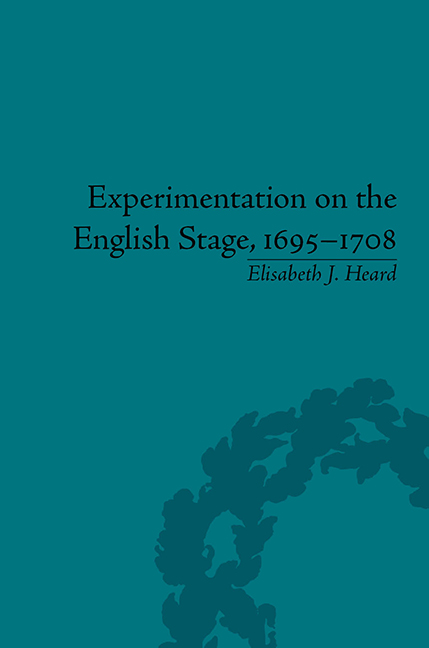Book contents
- Frontmatter
- CONTENTS
- Acknowledgements
- Introduction
- 1 The London Theatre World in the 1690s
- 2 Origins of ‘Humane Comedy’: Farquhar, Congreve, Cibber and Vanbrugh
- 3 Experimentation at the Turn of the Century
- 4 Successful Experimentation: The Recruiting Officer and The Beaux Stratagem
- 5 Farquhar's Contributions and the Post-1707 Theatre
- Conclusion: Farquhar and Anglo-Irish Drama
- Notes
- Works Cited
- Index
4 - Successful Experimentation: The Recruiting Officer and The Beaux Stratagem
- Frontmatter
- CONTENTS
- Acknowledgements
- Introduction
- 1 The London Theatre World in the 1690s
- 2 Origins of ‘Humane Comedy’: Farquhar, Congreve, Cibber and Vanbrugh
- 3 Experimentation at the Turn of the Century
- 4 Successful Experimentation: The Recruiting Officer and The Beaux Stratagem
- 5 Farquhar's Contributions and the Post-1707 Theatre
- Conclusion: Farquhar and Anglo-Irish Drama
- Notes
- Works Cited
- Index
Summary
In the 1705–6 and 1706–7 seasons, Farquhar produced his two greatest works, The Recruiting Officer and The Beaux Stratagem. Several of the characters Farquhar experimented with in his earlier plays – Sir Harry, Angelica, Dicky – were the inspiration for characters in his newest plays. Farquhar also used the knowledge he had gained about plot devices and funny situations and applied them successfully to his newest works. As a result, both The Recruiting Officer and The Beaux Stratagem had strong first runs and immediately entered the repertory. This chapter investigates the elements that made these plays so popular and argues that The Recruiting Officer and The Beaux Stratagem are a result of Farquhar's past experimentation. Kenny states in her introduction to The Recruiting Officer that ‘The laughter may have been more uproarious than in earlier plays, the stage business more boisterous; but the basic structure of romantic pairs and humorous triangles, of disguised trickery of one's intended and one's parent, of witty repartee above stairs and earthy, sparkling good humour below stairs, could not be considered new’. While Kenny raises an interesting point, I believe that Farquhar's final two plays are a result of his earlier successes and failures. What he is doing is indeed new.
The Triumph of Humane Comedy: The Recruiting Officer
The Recruiting Officer premiered at Drury Lane on 8 April 1706. The London Stage lists seven performances during the month of April, and 15 April is an author benefit. The only other performance recorded this season is on 11 June. Farquhar's experiences as a recruiting officer in the army served as an inspiration for the comedy. Disappointed over the reception of The Twin-Rivals, Farquhar took time off from writing and joined the army. By 1704 he had also married a widow ten years his senior, and the circumstances surrounding his marriage could have come directly from one of his plays. Farquhar, finding himself in financial trouble, courted Margaret Penell whom he thought was a rich widow.
- Type
- Chapter
- Information
- Experimentation on the English Stage, 1695–1708The Career of George Farquhar, pp. 85 - 112Publisher: Pickering & ChattoFirst published in: 2014

